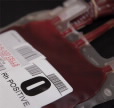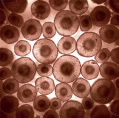FOR IMMEDIATE RELEASE
ACS News Service Weekly PressPac: July 14, 2010
ACS News Service Weekly PressPac: July 14, 2010
Contact
- Science Inquiries: Michael Woods, Editor, 202-872-6293
- General Inquiries: Michael Bernstein, 202-872-6042
![]()
Scientists are reporting an advance toward enabling more blood banks to adopt so-called “extended blood group typing,” which increases transfusion safety by better matching donors and recipients. Their report on a new, automated genetic method for determining a broader range of blood types appears in ACS’ Analytical Chemistry, a semi-monthly journal. Christophe Marquette...
![]()

Speakers made from carbon nanotube sheets that are a fraction of the width of a human hair can both generate sound and cancel out noise -- properties ideal for submarine sonar to probe the ocean depths and make subs invisible to enemies. That’s the topic of a report on these “nanotube speakers appears” in ACS’ Nano Letters, a monthly journal. Ali Aliev and colleagues explain...
![]()

Scientists are reporting discovery of a way to help proteins such as the new generation of protein-based drugs -- sometimes heralded as tomorrow’s potential “miracle cures”-- get past the biochemical “Entrance Forbidden” barrier that keeps them from entering cells and doing their work. The new technique, described in the monthly journal, ACS Chemical Biology, represents a new...
![]()

Mercury levels in a popular species of game fish in Lake Erie are increasing after two decades of steady decline, scientists are reporting. The study, the most comprehensive to date on mercury levels in Great Lakes fish, is in ACS’ Environmental Science & Technology, a semi-monthly journal. Satyendra Bhavsar and colleagues note that the Great Lakes is the largest group...
![]()
Electronic readers (e-readers), those increasingly popular devices that replace ink on paper, may have color displays in the future thanks to new advances in display technology. That’s among the topics highlighted in a three-part cover story on electronic materials in the current issue of Chemical & Engineering News (C&EN), ACS’ weekly newsmagazine. C&EN Senior Editor…
![]()
Journalists’ Resources

- Press registration opens for ACS August 2010 National Meeting in Boston
Press registration now is open for the ACS’ 240th National Meeting & Exposition in Boston August 22-26, 2010, with almost 8,000 reports on news advances in science. Watch for further information in the months ahead. - Press releases, briefings, and more from ACS’ 239th National Meeting
www.eurekalert.org/acsmeet.php
http://www.ustream.tv/channel/acslive - Must-reads from C&EN: The air’s aerosols, climate change & health
Carbon dioxide and other greenhouse gases may rivet public attention, but another component of the atmosphere plays a major role in global climate change and human health. For an update on scientific efforts to understand these culprits -- tiny suspended particles known as organic aerosols -- contact m_bernstein@acs.org. - ACS Pressroom Blog The ACS Office of Public Affairs’ (OPA) pressroom blog highlights research from ACS’ 38 peer-reviewed journals and National Meetings.
- Bytesize Science blog Educators and kids, put on your thinking caps: The American Chemical Society has a blog for Bytesize Science, a science podcast for kids of all ages.
- ACS satellite pressroom: Daily news blasts on Twitter
The satellite press room has become one of the most popular science news sites on Twitter. To get our news blasts and updates, create a free account at https://twitter.com/signup. Then visit http://twitter.com/ACSpressroom and click the ‘join’ button beneath the press room logo. - C&EN on Twitter
Follow @cenmag <http://twitter.com/cenmag> for the latest news in chemistry and dispatches from our blog, C&ENtral Science <http://centralscience.org>. - ACS Press Releases
Press releases on a variety of chemistry-related topics. - General Chemistry Glossary
- Chemical Abstracts Service (CAS) Web site on everyday chemicals
Whether you want to learn more about caffeine, benzoyl peroxide (acne treatment), sodium chloride (table salt), or some other familiar chemical, CAS Common Chemistry can help. The new Web site provides non-chemists and others with useful information about everyday chemicals by searching either a chemical name or a corresponding CAS Registry Number. The site includes about 7,800 chemicals of general interest as well as all 118 elements from the Periodic Table, providing alternative names, molecular structures, a Wikipedia link, and other information. - Science Connections from CAS
CAS - Science Connections is a series of articles that showcases the value of CAS databases in light of important general-interest science and technology news. Topics range from fruit flies to Nobel Prize winners, with the CAS - Science Connections series pointing to CAS databases for a more complete understanding of the latest news.
- Bytesize Science
Bytesize Science is a science podcast for kids of all ages that entertains and educates, with new high-definition video podcasts and some episodes in Spanish. Subscribe to Bytesize Science using iTunes. No iTunes? No problem. Listen to the latest episodes of Bytesize Science in your web browser. - Global Challenges/Chemistry Solutions
This special series of ACS podcasts focuses on some of the 21st Century’s most daunting challenges, and how chemists and other scientists are finding solutions. Subscribe at iTunes or listen and access other resources at the ACS web site www.acs.org/GlobalChallenges. - Science Elements
Science Elements is a podcast of PressPac contents that makes cutting-edge scientific discoveries from ACS journals available to a broader public audience. Subscribe to Science Elements using iTunes. Listen to the latest episodes of Science Elements in your web browser. Science Elements is on Facebook, friend it to see the latest updates and information. - SciFinder® Podcasts
Interested in healthful plant phytochemicals, nanotechnology, or green chemistry? Check out the SciFinder series of podcasts, which explore a vast array of current interest topics and new discoveries in the 21st century. The SciFinder podcasts are available in English, Chinese, Japanese, and Portuguese.
Note to Journalists and Other Viewers
This is the latest American Chemical Society (ACS) Office of Public Affairs Weekly PressPac with news from ACS’ 38 peer-reviewed journals and Chemical & Engineering News.
This information is intended for your personal use in news gathering and reporting and should not be distributed to others. Anyone using advance ACS Office of Public Affairs Weekly PressPac information for stocks or securities dealing may be guilty of insider trading under the federal Securities Exchange Act of 1934.
Please cite the individual journal, or the American Chemical Society, as the source of this information.
The American Chemical Society is a nonprofit organization chartered by the U.S. Congress. With more than 161,000 members, ACS is the world’s largest scientific society and a global leader in providing access to chemistry-related research through its multiple databases, peer-reviewed journals and scientific conferences. Its main offices are in Washington, D.C., and Columbus, Ohio.

